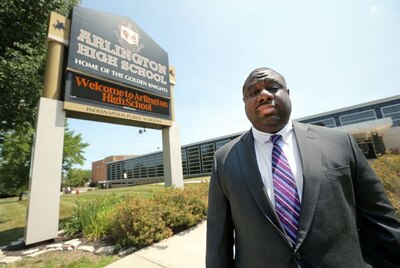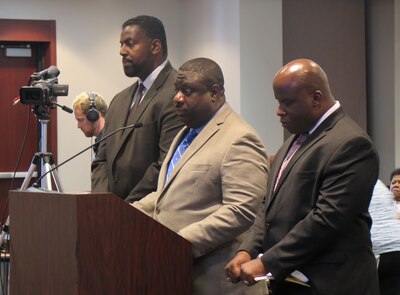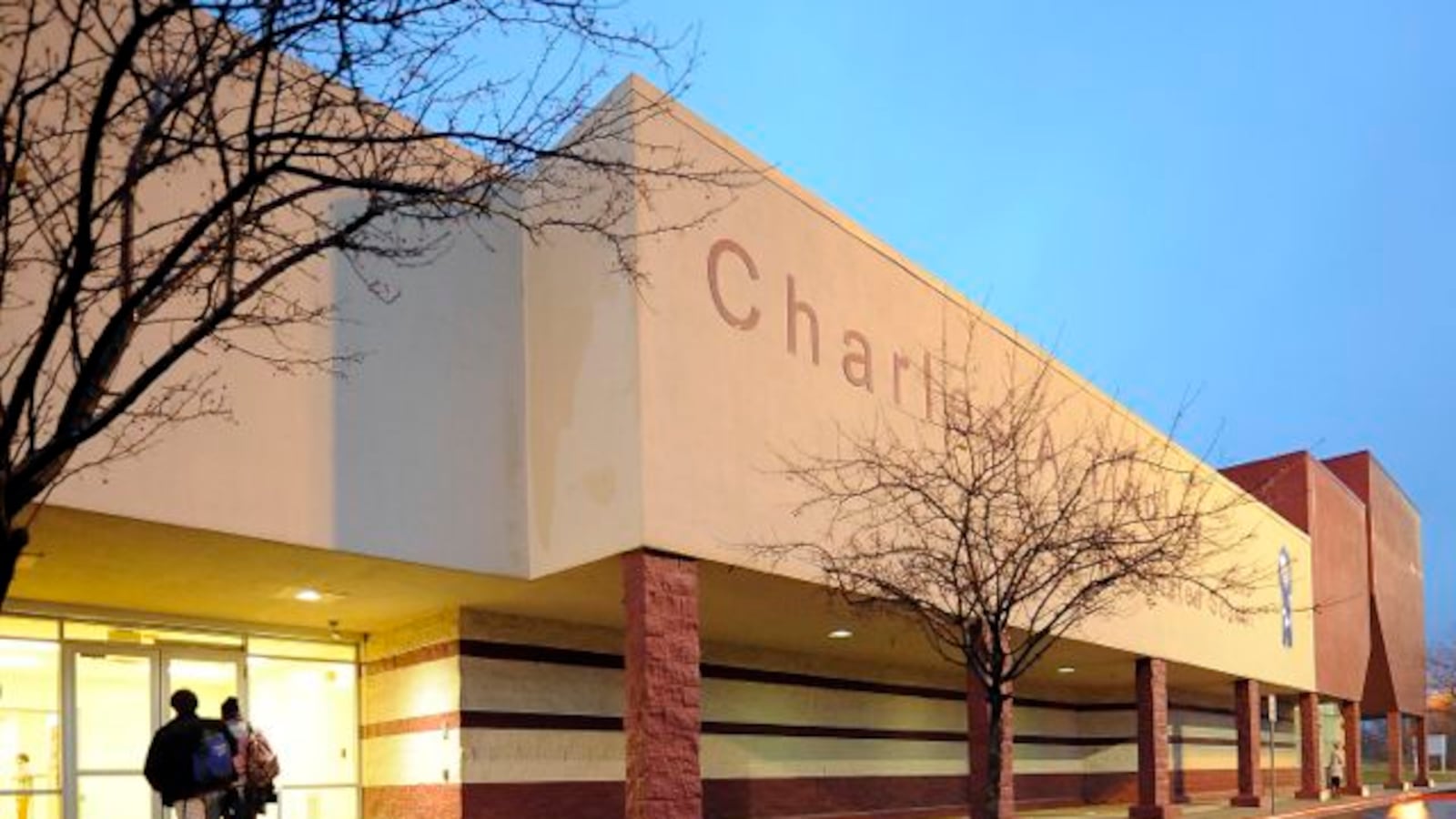Marcus Robinson has long had his critics, but in many ways, his name has been synonymous with the best successes of Indiana’s charter school movement.
Robinson was the driving force behind Tindley Accelerated Schools, the top-scoring charter school network in The Meadows neighborhood of Indianapolis. Tindley post some of the highest test scores in the city despite enrolling many children who must overcome poverty-related barriers to learning.
So revelations over the past two months of financial troubles at Tindley, including questionable travel expenses incurred by Robinson, have rippled far beyond the school.
Robinson said last week he would step down by the end of the school year and leave Tindley, but the controversy raises broader questions for charter schools in Indiana’s school choice epicenter. Among them:
- Will the departure of a key leader from one of Indiana’s strongest charter school groups weaken the movement? Robinson’s record and reputation made him one Indiana’s most respected charter school voices. But his last chapter at Tindley is now already serving as an example of the worst fears of charter critics about the potential misuse of public dollars intended to serve children.
- Will Robinson resurface somewhere else in Indiana’s charter school world? Robinson said his immediate goal is to finish a Columbia University doctorate he has been traveling to New York to pursue, but his next steps after that are in doubt.
- Are the well-regarded Tindley schools in trouble? The immediate road ahead looks bumpy. School officials pledged that they will solve their money problems, but further expansion plans — which once included ambitions for 14 Tindley schools by 2023 — have been halted.
Tindley champion David Harris, CEO of The Mind Trust, an Indianapolis nonprofit that advocates for educational change, believes Tindley’s setback will be short lived.
“The future is extremely bright, by far brighter than it’s ever been since I’ve been doing this work,” Harris said. “Tindley will not only weather this, they will be a big part of it going forward.”
But Joel Hand of the Indiana Coalition for Public Education, a group that has lobbied against expanding school choice, said he hopes Robinson’s resignation is seen as a cautionary tale about the potential excesses of charter schools.
“The use of these dollars for charter schools is supposed to be geared toward educating the children,” he said. “Maybe this is the ultimate accountability for Marcus Robinson and Tindley.”
A high-scoring, fast-growing charter network
For Tindley, it’s not just high test scores that have made the network a charter school darling. Robinson and his team have raised hopes that successful schools can be the centerpiece of a wider effort to improve struggling neighborhoods.
Since the first Tindley school opened in 2004 at the site of abandoned grocery store, The Meadows has seen crime fall and community investments grow as more kids attended, and graduated from, the now six-school network.
“It’s a transformed place,” Harris said. “The ripple effect will be felt for many generations in that community. They had a fabulous vision and a fabulous team, but Marcus was the one that made that come to a reality. What he accomplished is really extraordinary.”
Then-Mayor Greg Ballard hailed the school-led overhaul of The Meadows as a model for other neighborhoods to follow. By its fifth year, the school was exceeding state averages on standardized tests, graduating three-quarters of its students and sending most of them to college. A waiting list of families that wanted to enroll began to lengthen and some families were even moving into The Meadows to be closer to the school.
What followed was more than $60 million in investment in The Meadows, Tindley board member John Neighbors said. That includes the schools, new apartments, a wellness center and a YMCA.
“Had the schools not been successful, it would have been much harder to do that,” Neighbors said.
None of it could have happened without Robinson, Neighbors said. The school was actually rejected the first time it applied for a charter and was only able to secure one after Robinson, then a Cathedral High School teacher, came on board.
But as much as Robinson’s fans credit his leadership with building Tindley into a success, his recent choices have gotten much of the blame for the school’s suddenly murky future.
Financial woes come to light
Robinson has had to explain his own questionable travel spending at the same time he was pushing an aggressive plan to build new schools.
It was that expansion — since 2012, Tindley has added two middle schools and three elementary schools — that helped set the stage for the money problems the network faces today.
The new schools were made possible by a $4.5 million gift from a donor, Robinson said. It was helped along by consistently strong test scores that kept attracting more students. The four schools that have been open long enough to qualify for state grades earned two A’s and two B’s last year.
But Robinson and the Tindley board failed to anticipate the intense competition the new schools would face from a flood of new charter schools. Ballard, who left office in January, nearly doubled the number of city-sponsored charter schools in his tenure to more than 30, leaving many schools — not just Tindley — scrambling to fill their classrooms with enough students to pay their bills.

By 2014, Tindley was in enough of a financial squeeze that Robinson abruptly ended a contract with the state to manage Arlington High School, a former Indianapolis Public School that was taken over by the state in 2012, and Tindley pulled out at the end of that school year. He blamed the state for turning down his request for more aid, saying running Arlington had gotten too costly.
The school’s problems intensified later in 2014 when the Indianapolis NAACP criticized the network for its high expulsion rate, perhaps dissuading some families from enrolling their children. Tindley had expelled students at a much higher rate than other schools in the city but Robinson insisted tough discipline was not negotiable in order to ensure stable learning environments.
And by last December, the Indianapolis Business Journal reported a series bleak developments: a $2.8 million cash shortfall, a former treasurer who described the organization as “broke” and a $8.7 million bailout from a state loan fund that equated to nearly half its annual budget.
With all of that going on, reports of Robinson’s spending caught even some of his supporters by surprise.
Former Treasurer Eric Stovall told the Indianapolis Business Journal some of Robinson’s travel expenses, including $10,000 to stay in expensive hotels during several visits to New York and sometimes flying first class were, in his view, “unethical” for the leader of a cash-strapped charter school network.
But Robinson insists he violated no rules and would have paid the extra costs for the more expensive airline tickets and hotel rooms had anyone asked him to.
“Tindley has one of the best charter boards in the country,” he said. “They are very astute and serious about their fiduciary duty. They violated no laws and broke no ethics rules, nor have any of their staff in how they have traveled.”
Travel expenses raise concerns
Board member Neighbors said the board has put together a committee stocked with financial experts that he is confident will craft a plan to lead the school back to fiscal stability.
“The board needs to assure the financial integrity of the school,” he said. “We will conquer these issues if we can keep the kind of people we have in place and keep the parents’ confidence, which we will do.”
But it might be a while before anyone talks about expansion again.
“I don’t think there is additional money to fund growth in this market,” Robinson said.
Neighbors isn’t placing blame on Robinson. In fact, he argued that it’s a mistake to conflate Robinson’s travel expenses, which he said were noticed and addressed more than a year ago, with Tindley’s more recent financial troubles.
“We didn’t find any impropriety in Marcus’ conduct,” Neighbors said. “Maybe he should have thought more carefully about something like this. But he didn’t do it every week. It was a few instances of first class travel and staying in hotels that maybe he shouldn’t have.”

But Hand, whose organization seeks to defend what it sees as attacks on traditional public schools, said it’s difficult to see public education dollars flowing to an administrator’s lavish travel spending — something he said seems far more likely in a charter network than a public school district.
“I’d be shocked if there was any traditional public school administrator spending their money similarly,” he said. “The vast majority of public schools are cutting all travel for teachers and administrators and for professional development. To hear a story about charter school where the head of school is making these kinds of expenditures is very troubling.”
To Hand, Robinson’s spending, and Tindley’s deep financial woes, demonstrate one of the central dangers that critics of charter schools have long warned about: that relaxed oversight makes the public dollars ripe for misuse.
“Freeing up schools from certain regulations is not a bad thing,” Hand said. “But if its not accompanied with strict oversight and high levels of accountability we can have problems just like this.”
Whereas a public school is overseen by an elected school board accountable to the public, charter school oversight is more complex. Tindley is a private, nonprofit organization with a board of directors that employs its staff, but it also is monitored by the mayor’s office, which serves as its sponsor.
Kristin Hines, the city’s charter school director, noted that the city had called for Tindley to tighten up its financial practices following some recent reviews and audits.
“We continue to routinely and regularly oversee the board and the school’s financial performance, she said. “We have held the school responsible through annual financial reports in the past. We will continue to hold the school accountable to rigorous financial standard and high expectations with regard to board oversight.”
But Hand said the oversight in this case seemed to leave a lot to be desired.
“Doesn’t this kind of speak to the lack of accountability and oversight that is really there for many charter schools?” he said. “The use of these dollars for charter schools is supposed to be geared toward educating the children.”
A doctorate and an uncertain future
Robinson said the decision to leave Tindley was his alone and was not a result of the network’s financial woes.
“My top priority is finishing this doctorate I started four and a half years ago,” he said. “There was just no way I could do that at the helm of Tindley. The rigors are too much.”
Part of his motivation to finish, he said, is to reinforce with his actions the schools’ mantra for their students: They need to finish what they start academically.
“My first priority is to be a role model for what I expect from kids,” Robinson said.
After that? He’s not sure.
“It will definitely be about kids,” he said.
Robinson has two young children. He’s not necessarily looking to move on from Indianapolis. But he wouldn’t rule it out.
“I would hope my next opportunity would be here,” he said. “But I’m open to whatever.”
Neighbors said he wishes Robinson would have stayed on.
“What’s regrettable, and I hesitate to say this, what we’ve experienced over the last several months created enough stress in Marcus’ own mind to cause him to evaluate his situation and make the decision that he made,” Neighbors said. “I am personally disappointed that we move into a new era without Marcus but I am encouraged by what we have in place.”

